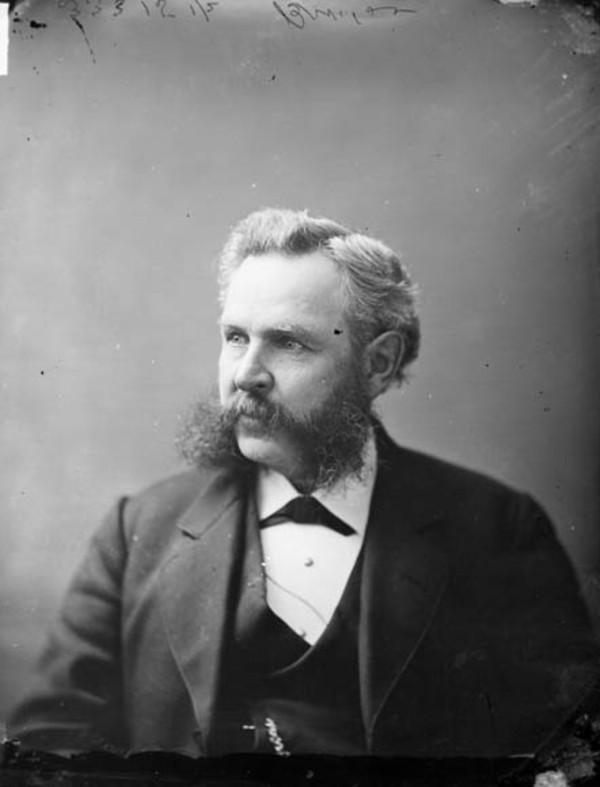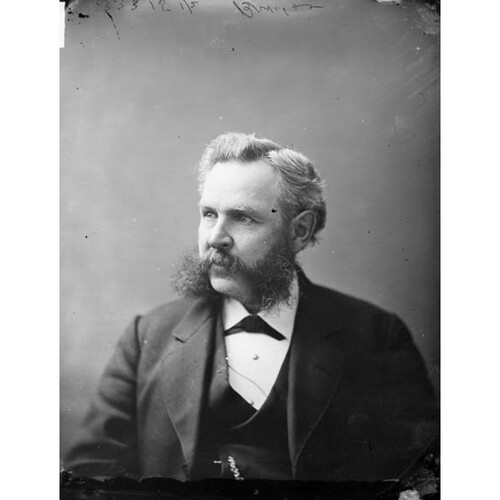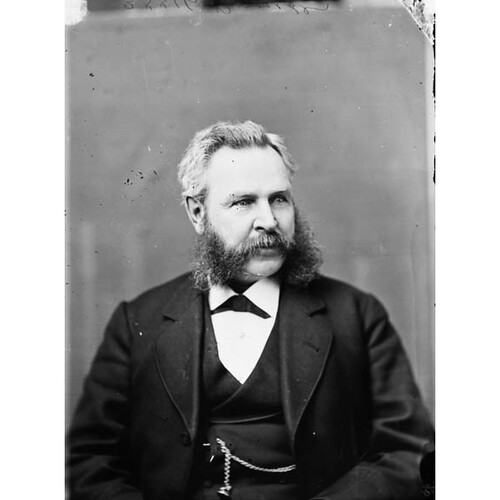BROUSE, WILLIAM HENRY, physician and politician; b. 15 June 1824 in Matilda Township, Dundas County, Upper Canada, second son of Lieutenant-Colonel Jacob Brouse and Nancy Parlow; m. 28 Jan. 1857 Frances Amelia Jones of Prescott, Canada West, who was from an established, influential family, and they had one son and one daughter; d. 23 Aug. 1881 at Ottawa, Ont.
William Henry Brouse’s ancestors, the Krausse family, emigrated from Germany to the 13 Colonies in the 1750s and changed their name to Brouse. At the close of the American revolution they left for British territory, settling on the banks of the St Lawrence River in Dundas County. William was raised on his father’s farm and attended local schools, taking time off to assist with the planting and harvesting. His father, however, was determined that William would receive a better education than his own and in September 1839 William entered the Upper Canada Academy in Cobourg, Canada West. He continued on into Victoria College, but left in 1845 without a ba. He received an honorary ma in 1849 and later served as a member of the college’s senate for many years.
After leaving Victoria, Brouse studied medicine with John Rolph* in Toronto for one year before attending McGill College in Montreal, where he earned an md degree in the spring of 1847. Later that year he was appointed to head the fever hospital at Iroquois Point, Canada West, which in that year contained some 300 immigrants. In 1848 Brouse moved to Prescott where he began a highly successful practice on both sides of the St Lawrence. He was elected to the medical examining board for Upper Canada in 1850 and from 1866 to about 1878 was a member by election of the Medical Council of Ontario, serving as its president in 1870. An appointment as the professor of surgery at the Toronto School of Medicine, affiliated with the University of Toronto, was refused by Brouse in 1878. Throughout his life medicine remained his chief interest and he practised until his death.
Professional success led to contact with the business community and Brouse served with the Toronto Life Assurance and Tontine Company as chief medical officer and as a director. During the 1870s he continued to develop business interests. By 1879 he was a director of the Ottawa Agricultural Insurance Company and by 1880 a director of the Prescott and Brockville Macadamized Road Company.
Brouse was also politically involved, and served as reeve, mayor, and postmaster of Prescott. His first attempt to enter provincial politics was unsuccessful. In 1858, running as a Liberal (described in 1872 by important Conservative John Hamilton as an “extreme grit”), Brouse was defeated by Conservative George Crawford* in a close election to represent the St Lawrence division in the Legislative Council. However, in the federal election in 1872 Brouse was returned for the riding of Grenville South, a seat he held until he was called to the Senate on 9 Aug. 1878, just before the return of a Conservative government. In 1872 and 1874 Brouse had defeated the prominent Conservative Walter Shanly*, who had held the seat from 1863 to 1872 and held it again from 1885 to 1891. Shortly before his death Brouse moved to Ottawa where he continued to sit in the Senate and also practised medicine.
Although not a major politician, Brouse was certainly an active one. Patronage problems were given diligent attention, and he was always vigilant about the best interests of St Lawrence shipping and the maintenance of the natural beauty of the Thousand Islands area. He intervened regularly in debate and his speeches on public health were based on impressive research into conditions in the United States, Great Britain, and Europe. Brouse favoured a dominion sanitation bureau to educate people concerning public health. Having served for years as surgeon for the 56th Battalion of Infantry, he was also interested in the militia and military matters. He brought before the house, and successfully campaigned for, a $50,000 annual grant for the veterans of the War of 1812; he also proposed, unsuccessfully, that some recognition be granted to the loyalist veterans of the rebellions of 1837–38. He agitated for the introduction of a systematic drill in schools as “an early initiation to all that is implied in the term discipline: viz., duty, order, obedience to command, self-restraint, punctuality and patience.”
A man of obvious professional prestige who represented important sections of the élite within the Liberal party, Brouse held a difficult seat for two parliaments. Familiar with some areas of the business community, he could boast strong local ties as well as contacts and influence beyond his region, especially in Toronto. Brouse was, therefore, a useful party member, if not a distinguished politician.
AO, MU 469–87. PAC, RG 31, A1, 1871 census, Grenville County, Prescott; MG 26, A; B, Letterbooks 3, 6, 7. Can., House of Commons, Debates, 1875–78; Senate, Debates, 1879–81. Daylight through the mountain: letters and labours of civil engineers Walter and Francis Shanly, ed. F. N. Walker (Montreal, 1957). Globe, 24 Aug. 1881. Ottawa Daily Citizen, 24 Aug. 1881. Canadian biog. dict., I. Canadian directory of parl. (J. K. Johnson). CPC, 1872–73, 1875, 1879. William Canniff, The medical profession in Upper Canada, 1783–1850 . . . (Toronto, 1894). T. W. H. Leavitt, History of Leeds and Grenville, Ontario, from 1749 to 1879 . . . (Brockville, Ont., 1879; repr. Belleville, Ont., 1972). Swainson, “Personnel of politics.”
Cite This Article
Donald Swainson, “BROUSE, WILLIAM HENRY,” in Dictionary of Canadian Biography, vol. 11, University of Toronto/Université Laval, 2003–, accessed September 18, 2024, https://www.biographi.ca/en/bio/brouse_william_henry_11E.html.
The citation above shows the format for footnotes and endnotes according to the Chicago manual of style (16th edition). Information to be used in other citation formats:
| Permalink: | https://www.biographi.ca/en/bio/brouse_william_henry_11E.html |
| Author of Article: | Donald Swainson |
| Title of Article: | BROUSE, WILLIAM HENRY |
| Publication Name: | Dictionary of Canadian Biography, vol. 11 |
| Publisher: | University of Toronto/Université Laval |
| Year of publication: | 1982 |
| Year of revision: | 1982 |
| Access Date: | September 18, 2024 |





